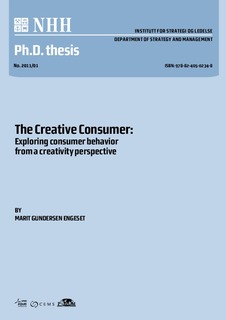| dc.description.abstract | This research focuses on consumer creativity and uses frameworks from creativity theory to
understand consumer behavior. Because this is a relatively new field of inquiry, the work belongs
mainly in the context of discovery. Therefore, the topic was approached in an open, exploratory
manner. Instead of formal hypotheses, a set of propositions and models were developed and tested
empirically in a field study.
Four concepts relevant to the understanding of consumer behavior from a creativity perspective are
advanced: (1) creative cognitive processing, or the degree to which consumers engage in creative
processing during decision making; (2) creative product, or the degree to which a solution to a
consumption problem is considered creative; (3) creative person factors, or different psychological
facilitators of creativity (i.e., knowledge, motivation, innovativeness, and efficacy); and (4) solution
evaluation, or the degree to which a consumer evaluates his or her solution to a consumption
problem favourably. In line with previous literature, a conceptual model, as well as four propositions
about these concepts and their relationships, was developed. To obtain measures of creative
product, 245 participants responded to a scenario that asked what they would serve at a dinner
party. Thought protocols describing participants’ thinking during decision making were the basis for
measures of creative cognitive processing. Psychological facilitators of creativity and solution
evaluation were measured on established scales. Analyses were performed in SPSS and LISREL VII.
This dissertation contributes to consumer research by applying a creativity framework to understand
consumer decision making. To the best of my knowledge, it is the first to explore consumer creativity
in less constrained settings, and the results show high variability in terms of both creative cognitive
processing and creativity in solutions. It has previously been proposed that creativity in solutions to
consumption problems should be conceptualized as a three‐dimensional construct, but this has not
been tested empirically previously. This research contributes by demonstrating that such a
conceptualization is valid and reliable. A creative product assessment scale was developed in a
separate study. The scale contributes to consumer research by providing a tool for assessing
creativity in solutions to consumption problems. This research adds to the literature by identifying
relationships between important antecedents, such as knowledge, motivation, self‐efficacy, and
innovativeness, on creativity in a mundane, everyday problem‐solving situation. Finally, creative
cognitive processing and creative production have positive effect on participants’ solution evaluation. This underscores the relevance for marketers to focus on consumers as creative problem
solvers. | en |
